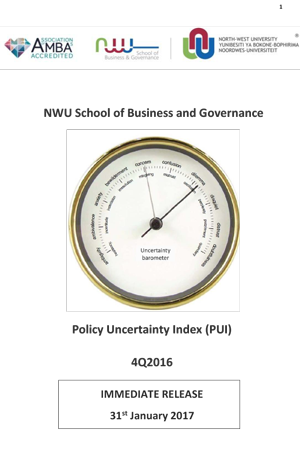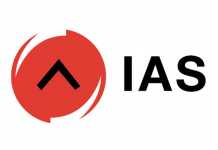Opening of the NWU School of Business & Governance
Discussion with Mr. Tim du Plessis and Prof. Tommy du Plessis on the nature of uncertainty at the opening of the NWU School of Business and Governance, 30 January 2017.
As outlined when the PUI was launched last year, the role of policy uncertainty has loomed large in much of the recent economic debate in SA. It is seen to have important implications for business confidence and the investment climate in the country. Hardly any recent economic assessment or media release from international or local financial institutions, business lobbies, economic analysts, financial journalists or credit rating agencies appears without the inclusion of the words ‘policy uncertainty’ occurring in them.
The design of a policy uncertainty index for SA has nonetheless been spurred not only by economic circumstances in the country, but also by the increasing academic and policy interest globally around the cause, effect, measurement and definition of policy uncertainty.
There have been many manifestations of policy uncertainty in SA over the years. The institutional setting and policy making environment clearly influence the extent to which negative shocks and developments lead to bad outcomes and tough policy challenges. It seemed that the time had arrived to craft a more accurate measurement of this recurrent factor in SA’s economic outlook. A deeper understanding of how uncertainty ‘shocks’ affect the SA economy helps policy makers to assess how future shocks will impact markets and business. The outcome of this research will now be made regularly available on a quarterly basis to hopefully fill a gap in our monitoring of the economic environment.
A NWU team therefore spent much of 2015 interrogating the policy uncertainty models used elsewhere in the world, adapting various elements to South African circumstances, and then conducting a series of trial runs using a new, tailored design.
Interesting correlations have been found of the policy uncertainty index with economic outcomes. Empirically it shows that when economic policy uncertainty is strongly present in the environment, it indeed lowers investment, employment and output. High levels of such policy uncertainty inhibit meaningful investment and consumption. Elevated policy uncertainty in many countries contributes to sluggish growth. Economic policy uncertainty then has actual consequences for the economy.
Research suggests that uncertainty is very different across economies. Developing countries seem to have about one-third more macro-economic uncertainty than developed countries.
However, this may now be changing with events such as Brexit and the election of US president Donald Trump.
The PUI is published in January, April, July and October of each year. An increase beyond 50 reflects heightened policy uncertainty; a decline in the PUI means reduced uncertainty. The value of the PUI as a proxy for policy uncertainty will lie in tracking changes in policy uncertainty over time, and as the index settles down in the period ahead and builds a track record.
























































































